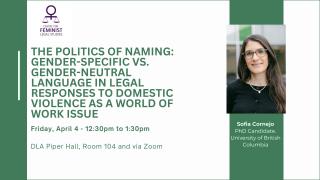Event Description
In this lecture, winner of the CFLS Graduate Speaker Competition Sofia Cornejo will present on "The Politics of Naming: Gender-Specific vs. Gender-Neutral Language in Legal Responses to Domestic Violence as a World of Work Issue."
Historically, domestic violence has been viewed as a personal matter, unrelated to the workplace and excluded from employment law. Over the past two decades, however, this view has begun to shift as growing evidence has revealed the intersections between DV and work in survivors’ experiences as workers. Research indicates that DV impacts workers’ performance, attendance, and job stability, with abusers often extending their tactics into their partners workplace. In response to the growing recognition of the intersections between DV and work, Argentina and Canada, among other countries, have introduced employment laws to address this issue. Extending leave rights to survivors, for example, is one of the most widely adopted mechanisms in this area. In light of this legal shift, debates over the framing of violence and abuse gain renewed significance, raising critical questions: How do employment laws name and define DV as a world of work issue? Do these laws acknowledge the gendered nature of abuse, or do they adopt a neutral stance that risks misrepresenting survivors/workers’ experiences? What impact do these linguistic choices have on how survivors’ experiences are recognized and addressed?
In this presentation, Sofia addresses these questions by critically comparing the different approaches to name and define DV in the employment laws of Argentina and Canada. Argentine laws predominantly employ gender-specific language and broad definitions, emphasizing that DV is a manifestation of systemic gender inequality. Canadian laws, by contrast, typically adopt gender-neutral language and behaviour-specific definitions. Sofia's analysis suggests that the use of gender-specific language tends to have a positive influence and involve responses that are more sensitive to survivors/workers’ needs and experiences of violence and abuse, allowing for more flexible and comprehensive rights and protections. However, regardless of the approach to name and define violence, limitations remain due to the persistent influence of public/private dichotomy and gendered assumptions about DV and work.
Speaker
- Centre for Feminist Legal Studies
- General Public
- All Students
- Alumni
- Faculty
- Graduate Students
- JD
- Staff
- Research Talks
- Student Events

